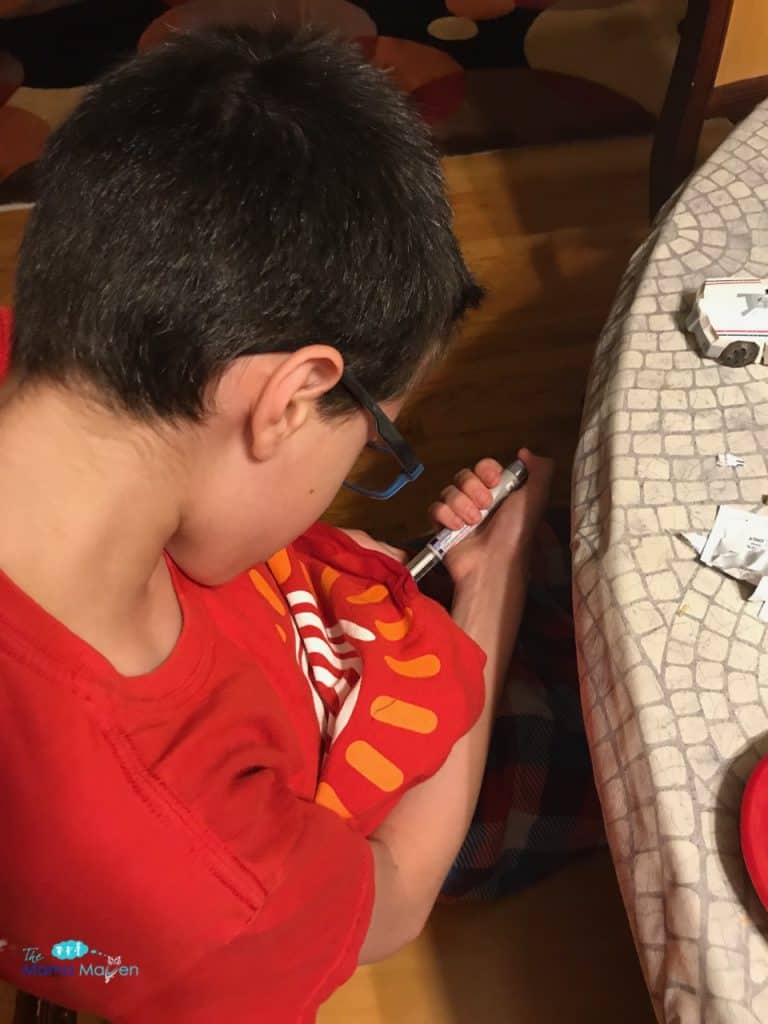Note: I am not a doctor or have medical training. I talk about Type 1 Diabetes from a parent’s point of view. Always consult your endocrinology team if you have any questions. I advocate for my child until he can advocate for himself.
So I wanted to give an update on how my son is doing and how we’re doing as a family, dealing with his Type 1 Diabetes. Two weeks ago we were in the Pediatric ICU. Read how we got there. For the past two weeks, we’ve been learning how to deal with this. While it hasn’t been easy, we’ve been trying to find a rhythm with the cycles of taking blood sugar and injecting insulin and deal with high blood sugar. Our Diabetes Story: Type 1 Diabetes Update for My Kid, Two Weeks In

My son has had the hard part. He has given himself insulin for the past two weeks. I was prepared to give him the shots, I had actually steeled myself that I would have to do it – but this amazing kid totally surprised my husband and I. While there were arguments and anger, and even tears – he still gave himself every single injection. He looks so much healthier now as he’s gained a little weight (including the 2 pounds he lost in the spring or summer). His color is better, he’s happier, he isn’t as tired.
I’ve also stopped taking his blood sugar readings and make him do that now. While I didn’t mind doing it, I knew that he needed to do it. I still do the calculations for the blood sugar correction and covering his food, but I need to train him on that.
This is what our days look like generally:
Wakeup, then B takes his blood sugar and I write it down in a little notebook that the Endocrinologist’s office gave us. I try to make his breakfast the night before so I have the carbs counted. If I don’t have time the night before, I have to calculate the carbs while B takes his blood sugar. For the first week, this took a while, but it is getting easier now. Once he gives me his blood sugar reading, I have to do the calculations for his insulin dose. More on that another time. Kat, the nurse in the PICU at Cohen’s Children’s Hospital wrote us out a whole mathematical formula that I photocopied and still use. Then once I have the calculations I tell him the dose to take of his insulin. He takes it and then I give him his breakfast.
He needs a snack in the morning – we make it low carb so he doesn’t have to get a dose of insulin. He can have a cheese stick, cucumbers, celery, small amounts of nuts (as long as it’s under 5 carbs) or any snack 5 carbs and under. He usually reaches for cheese and some nuts.
Then at lunchtime, we calculate his lunch carbs, take his blood sugar and he gets a dose of insulin again.
We do the same thing as dinner time.
At bedtime, B takes his blood sugar again and then gets a dose of long acting insulin.
We all relax.
But really, I don’t. I get nervous if his blood sugar is high (we’ve only been below 150 once – but that’s another story). There have been too many nights that he goes high and I’m convinced we’re going back to the hospital (I have a bag semi packed in the front closet). I’m learned to calm down, call the doctor, and just give another dose of his daytime insulin to correct his blood sugar and then give his night time dose of insulin.

There are nights that I am afraid that his blood sugar will plummet at night. We’ve only had to test at midnight one time and he woke me up to test – while I know there will be many more scary times ahead, I’m just hoping we can continue managing it.
He started 6th grade yesterday and I’ll update you on that fun (not so fun) process.
Any personal comments on ways to manage this, tips, hints, good healthy carb dinners, lunches, etc would be appreciated.
Our Type 1 Diabetes Story
Note: I am not a doctor or have medical training. I talk about Type 1 Diabetes from a parent’s point of view. Always consult your endocrinology team if you have any questions. I advocate for my child until he can advocate for himself.




Does his blood monitor not work out the dose for you? My mum, dad and bro have one which you input the ratio in then when you test the blood you put in how many grams carbs you’ve consumed. It uses the carbs consumed plus current blood levels to tell you exactly how much insulin to take. So much easier than having to do the math all the time. It also takes into account any active insulin you still have so if you test again and its showing high it’ll calculate a corrective dose if you need it based on whats in your system so you don’t end up in a hypo. Might be worth looking into, it’d help his independence of learning to control it himself. Stay positive! Diabetes is a steep learning curve but you’ll both get there. Take care.
Thank you, Lisa — we are getting the Dexcom monitor really soon. Today marks 3 weeks since this happened, so we’re at the beginning stages. I think the monitor will make it so much easier.